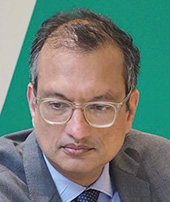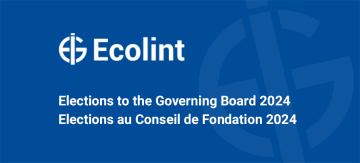Arafat JAMAL

| Nationalities | Swiss, American |
| Languages spoken | English, French |
| Resident in the Geneva region since | 1984 |
| Ecolint Alumni (campus) | La Grande Boissière (1988) and former parent La Châtaigneraie (Children graduated in 2021 and 2023) |
Biographical Data
Arafat is a senior United Nations diplomat by profession, and an internationalist by background and conviction. His youth was marked by series of global moves (North America, Africa, Europe), anchored by attendance at international schools. Ecolint was a formative element in this background, as Arafat (often known as Arif at school) spent four enriching years at the LGB campus, taking his IB there in 1988.
Completing his education in the US (Cornell) and UK (Oxford), Arafat embarked on an international UN career (with UNHCR and OCHA) that alternated between working on frontline humanitarian situations (Afghanistan, Turkmenistan, DR Congo, Lebanon, Jordan, Libya, South Sudan), and on multilateral diplomacy and partnerships in Geneva, New York and elsewhere. Time permitting, he also lectures and writes on issues of forced displacement and multilateralism.
Although Arafat has not played team sports since his Ecolint days (rugby), he is sometimes spotted these days trying to keep fit by distance running through the Vaud countryside.
Switzerland has been a family base since 2012, and Arafat and Shalini’s two daughters both attended and graduated from Ecolint (La Châtaigneraie).
What does Ecolint mean to you?
Ecolint is about achievement without pressure; excellence without elitism; and values above status. For me personally, it has been a community: a place where (mostly…) amazing and committed teachers have helped to build up the intellect and values of myself, and our daughters.
What skills/expertise can you bring to Ecolint?
I am deeply experienced in working with large, international organizations, and with the challenges of governance and accountability in such contexts. While I am sensitive and tactful in dealing with interlocutors from a diversity of backgrounds, I am also focused when it comes to pushing for concrete, principled results.
Understanding that the Governing Board focuses on long-range and strategic issues, and not specific management, personnel, or curricular issues, how would you support the Ecolint Mission if you were elected to the Governing Board?
This is the most important function of the Board — to ensure that Ecolint remains a distinct, principled, attractive and financially robust institution over the long term. Ecolint has history and standing, and the Board has a responsibility to provide the institution with firm, sober and creative guidance to take it forward. I have considerable experience in strategic planning within the UN and the global humanitarian system, and I would be honoured if I could support Ecolint with this.
The Ecolint Governing Board is the key governance body of the International School. What is your understanding of the tasks you are called upon to perform in this context? And, what particular skills and experience would you draw on to fulfil this role?
To act as the guardian of Ecolint’s mission, and to oversee its strategy, functioning and financial health are the overall tasks of the Board. As a seasoned member of the UN system, I have been in several leadership positions in which I have overseen large budgets (most recently an annual USD 100 million budget in South Sudan), and as such have been subject to rigorous audits, inspections and evaluations (all of which have been unqualified). I understand the level of responsibility expected, and believe that my experiences equip me to apply a strong and firm level of scrutiny, and expectation of accountability, as a member of the Governing Board.
Fair and equitable access to an education of excellence such as that of the International School of Geneva is at the heart of the objectives on which the Governing Board must focus. What might your thoughts be on this matter at this time? Do you have any particular expertise that you could draw upon in such societal matters?
In my UN career, I have implemented and overseen several programmes aimed at enabling underrepresented groups to gain access to education. In the 1990s, I helped to found and run undercover girls’ schools in Taleban run Afghanistan; more recently, I have worked with Germans, Turks and others to obtain coveted university bursaries for high-performing refugee students. I am a firm believer in creating level playing fields for willing students to access education of quality and excellence. I have some notions of how this could be effected, but would welcome the chance to work with the Board and the Ecolint community to do even better on this score.
Ecolint aims to ensure a framework that serves to provide a distinctive high quality international education through which all students are helped to develop their abilities to the highest level of the potential. In your opinion, what are the different elements that are critical to this framework (buildings, interior and exterior spaces; technical supports and equipment; management team, teachers, and administrative staff; or others...)?
You have to start with the teachers. I would like to see how we can continue to attract and retain a high-performing, inspirational and diverse teaching contingent. These teachers must be able to work within a curriculum that provides rigour and recognition (IB), while allowing for the flexibility to go beyond ‘teaching to the test’. Beyond the teachers and other staff that must be the spine of the school, the built environment is important. The Ecolint campuses already enjoy some state of the art facilities. We should ensure that these are well maintained and — where needed in order to boost academic, sporting or artistic success — upgrade them. Finally, Ecolint should be able to integrate into its wider communities — to both offer facilities (as it does with the performing arts centre) and tap into communal and cantonal resources.
Ecolint embraces diversity and honours the unique voice and personal experience of all members of the community. What do you think of this statement in terms of your experience as a member of the community? In your opinion what should be the role of the Governing Board in strengthening inclusion of diversity in the Foundation?
As a former Ecolint student myself in the 1980s, i recall that diversity was our ecosystem and our advantage. Classes were great, but the experience of coexisting with students of such varied national, religious and economic backgrounds made it special. Ecolint is not Ecolint without diversity, and diversity should be best conceived of as an environment where all students feel safe and respected, but not smothered. Diversity should ideally lead to healthy discussion, debate and understanding. I would like to see the Board take a serious, non-doctrinaire look at the state and role of diversity at Ecolint, and see what we can do to capitalize on our history, location and ethos to make this element even more meaningful.
Are you aware of the financial information related to the Foundation? While efforts have been made, what else can be done in your opinion, to make the Foundation more sustainable in the long term continuing to ensure affordable fee structures while providing qualitative inclusive education in an effort to make global citizens and optimum capital development efforts?
Ecolint is currently in a healthy financial situation. The Board’s responsibility should be to take a long term view, to see how we can keep ourselves on an even keel, while ensuring that we are able to fund both core and new priorities.
